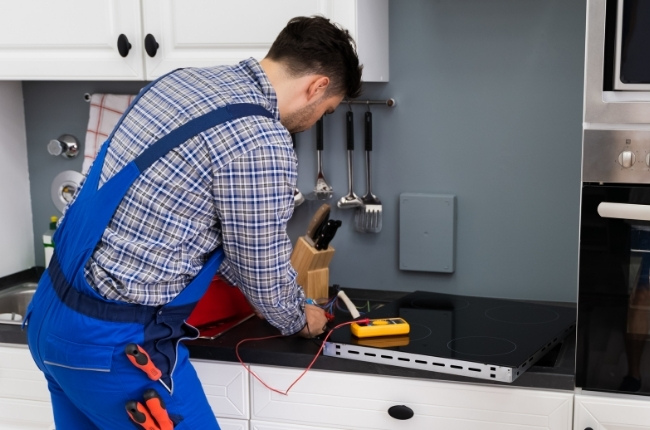Induction cooktops are investments.
If you have an induction range or a stove from one of the high-end brands, you treat it as nicely as possible to make it last longer.
So it’s a bit frustrating when your beloved induction suddenly starts beeping.
Why does my induction cooktop keep beeping? Is it something I can solve, or do I have to call the repairman for it? Because THAT is too much hassle and money!
To end your woes, here are some tips on dealing with this problem. Get reading!
Why does my induction cooktop keep beeping?
Did you know that induction cooktops make noise?
For an induction newbie, the possible hissing, humming, or buzzing may come as a surprise. And it may even spell trouble!
One thing the salesperson probably forgot to tell you is how to identify “normal” noises from abnormal ones!
Yes, while they may all sound alarming and even strike panic in your heart, you can actually pinpoint what noises you can expect from your induction while you are on a learning curve.
Induction cooktops do not operate like your ordinary stove. They don’t heat themselves. Even if you put it in a high-temperature setting, you’d still be able to put your hand on the glass-ceramic surface!
PS. It only works if you don’t have a pan heated beforehand!
When you plug the power into your induction stove, an alternating current runs through a metal coil inside the cooktop. The metal coil, typically copper, produces an oscillating (changing) magnetic field.
If you put ferromagnetic cookware on your cooktop, the particles inside the cookware vibrate in response to the fluctuating magnetic field.
The vibration of the particles causes friction which then causes heat on the ferromagnetic cookware.
You don’t even see flames, yet your cookware has heated itself! That’s science for you!
Why do you need to know this?
Imagine this: You bought an induction range with an 11-inch burner zone that requires 3500-W power and set it at maximum. The magnetic field it will produce is so strong that the particles inside your cookware will also respond very strongly. Hence, the singing cookware.
Generally, heavier materials such as cast iron are less likely to “sing” compared to multi-ply stainless steel pans.
It’s not only the singing that you must be aware of. There are other types of noises that you can expect from your induction that DO NOT signify defects.
- If it crackles, you’ve likely left a ferromagnetic utensil in your cookware. Loose-fitting handles and lightweight lids can also have the same effect.
- If it whistles, your cookware may be too big/too small for your cooking zone. Typically, if it doesn’t whistle outright, you’d notice some humming regarding the same issue.
- You may note a low humming sound when the cookware is heating up. If you notice a hissing noise accompanying the humming, it’s likely the fan dissipating the heat generated during cooking.
- It may also buzz or rattle, which could mean the material may be lightweight or low-quality cookware, e.g., a clad cookware where a non-ferromagnetic middle layer is not welded in but merely encapsulated. The buzzing may also happen to round-bottomed pans as opposed to flat-bottomed ones.
- If it clicks or ticks, it’s likely the electronic switching operations, e.g., the power controllers cycling the elements on and off to provide stability.
Tip of the day: Don’t use the maximum setting always! Use less power and ensure that the pan and the burner zone match in size.

Now that you know the normal sounds, let’s hop onto an example of an abnormal one — beeping.
“Why is my induction beeping?” The answer to that is… tadah! There is no universal answer.
Every brand beeps differently.
Not only does the sound vary, but the beeping can also signify different things— from simple obstruction to inappropriate cooking vessels.
Thus, the best way to proceed is to get the user’s manual and go to the troubleshooting page.
If you somehow lost the manual and the induction stove won’t stop beeping, you can try the solutions discussed below.
How do I stop my induction hob from beeping?

Calling the repairman isn’t fun and, indeed, isn’t cheap. Most of the time, you’d want to try some hacks before calling for professional help.
Typically, a manufacturer’s manual will solve your worries but if you don’t have that, try these solutions instead.
- Try using smaller or lighter cookware. In this instance, it may be a simple problem of overloading your cooktop. It simply can’t handle what you wanted to put there! If you can’t find a different pan, try restarting it. Turn the power off for a few minutes before switching back on.
- Clean the control panels. The beeping sound may indicate leftovers that block your control panel. Wipe it off gently until there is no debris.
- Leave it unplugged. Someone posted at the Houzz forum about a beeping sound after they moved the cooktop for cleaning. Yikes! The user confirmed that once they unplugged it for 25 minutes, the beeping ceased. Otherwise, you may want to leave it unplugged overnight.
- A beeping with an error code that indicates no pan is detected, even if you have tested many already, may simply be a case of loose wiring. If you are confident enough to inspect the electronics inside your cooktop, try to see if every wire is connected. Otherwise, call for a technician.
- Cycle the circuit breaker. If there is continuous beeping, reset the cooktop by turning off the circuit breaker for a minute. Turn the breaker back on, plug in the cooktop and ensure that the cooktop works.
- An older induction stove may cause various noises, including beeping, despite the lack of any issues. If this is the case, call a service engineer or start looking for another induction stove.
These are general tips that you can try at home. The next ones will look into specific brands and how you can resolve the beeping independently.
READ NEXT: How to clean induction cooktop
Bosch induction cooktop beeping
If you are wondering about beeping problems with your Bosch, you may either be talking about the continuous beeping or the loud display beeps that can be annoying.
The continuous beeping may imply a faulty display screen. If that’s the case, disconnect the cooktop from the power source for 2 minutes to reset the hob.
You may also experience a non-responsive touch panel followed by a beep-beep-beep-pause noise. If resetting it will not work, try tripping or cycling the breaker to resolve the issue.
Otherwise, call a Bosch service engineer.
If you worry about the loud display beep, Bosch provided a solution for this in their manual.
You must turn off the cooktop and set all elements to level 3. From right to left, turn the hotplates to level 0. Touch the power key for 5 minutes. A confirmatory beep will signal that you have successfully turned off the display beep.
Hanabishi induction cooker beeping
If you are into affordable induction stovetops, you probably encountered the brand Hanabishi. It’s a Philippines-founded brand with a nod to Japanese manufacturing excellence.
There are not a lot of manuals available online for Hanabishi products. Troubleshooting reviews for Hanabishi induction cooktops may require opening them and then trifling with the electrical components.
Unlike Bosch, Hanabishi does not have a variety of features. It’s simple. Hence, you might be able to solve audio issues like beeping by restarting or unplugging it for several minutes.
Philips induction cooker keeps beeping
Coming from a technology company, you wouldn’t expect a lot of nuisance from Philips. They are known for premium single-burner induction cookers that do not leave a hole in your wallet.
If you find beeping trouble with your current Philips induction cooker, don’t fret much. Philips Support addressed this issue as either an unsuitable cookware problem or an incorrect vessel placement.
They advised users to choose cookware made of iron or steel with a base diameter greater than 12 cm. Moreover, place your cookware on the red circle guide found at the center of the cooker’s surface to ensure it’s working.
Kitchenaid induction cooktop keeps beeping
Is your Kitchenaid induction cooktop bothering you with the constant beeping? You are not the only one with that problem.
Kitchenaid is an American home appliance brand known for its cookware sets. It’s a pretty good brand with mediocre reviews for its induction cooktop.
If you find an audio problem, particularly continuous beeping, Kitchenaid clarifies the issue as an obstruction to the control area.
You might not know this, but liquids and solids or any object can put pressure on the control panel and cause a beeping sound. Kitchenaid suggests wiping off the control area surface.
However, if that doesn’t resolve your problem, try resetting the cooktop. Turn off the breaker to power the range down for one minute. Turn it back on to see if it is still operating.
If the problem persists, it’s better to schedule a service from Kitchenaid.
LG induction cooktop keeps beeping
You will likely find the same answers for your beeping problems with your LG induction cooktop as the ones mentioned above.
As you might already notice, resetting or restarting often works with the beeping complaints. It’s almost like switching to default mode makes the cooktop forget what it’s stressing about!
Albeit a different brand from the others above, the LG induction cooktop beeping noise is solvable by pressing the power button off and on again.
If immediately restarting the cooktop does not work, try unplugging it, leave unplugged overnight and restart it only the next day.
Also, it’s wise to keep liquids or moisture off the control panel as much as possible since this can trigger the beeping sound too.
Again, you can try powering on and off your circuit breaker to see any difference.
Overall, you’d see in most cases that cleanliness and letting your cooktop rest before powering it again resolves the problem.

Leave a Reply